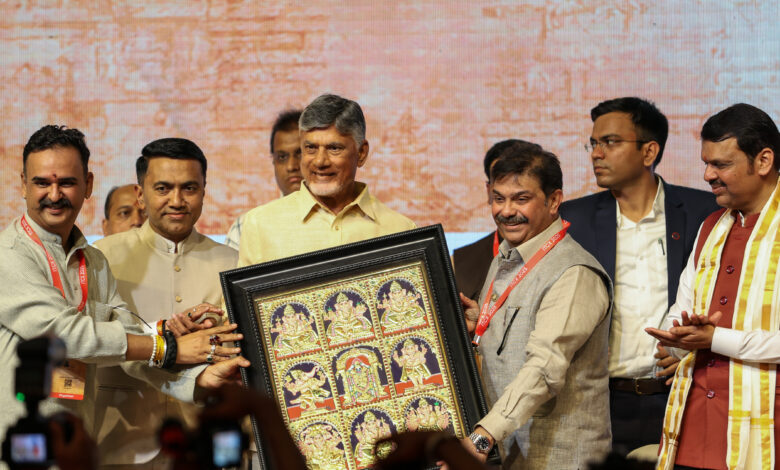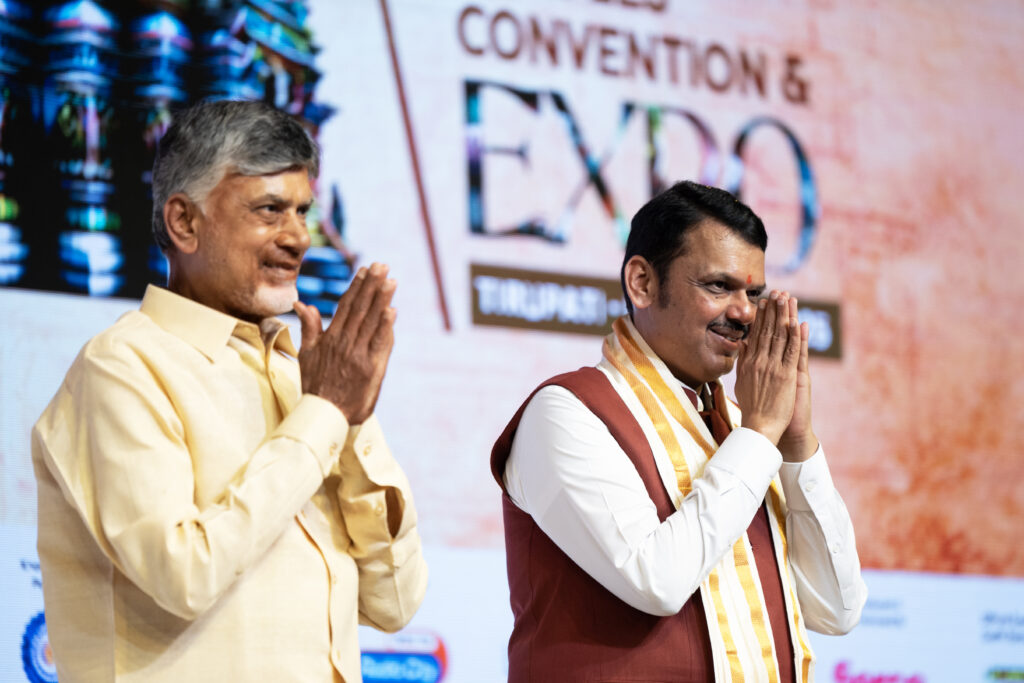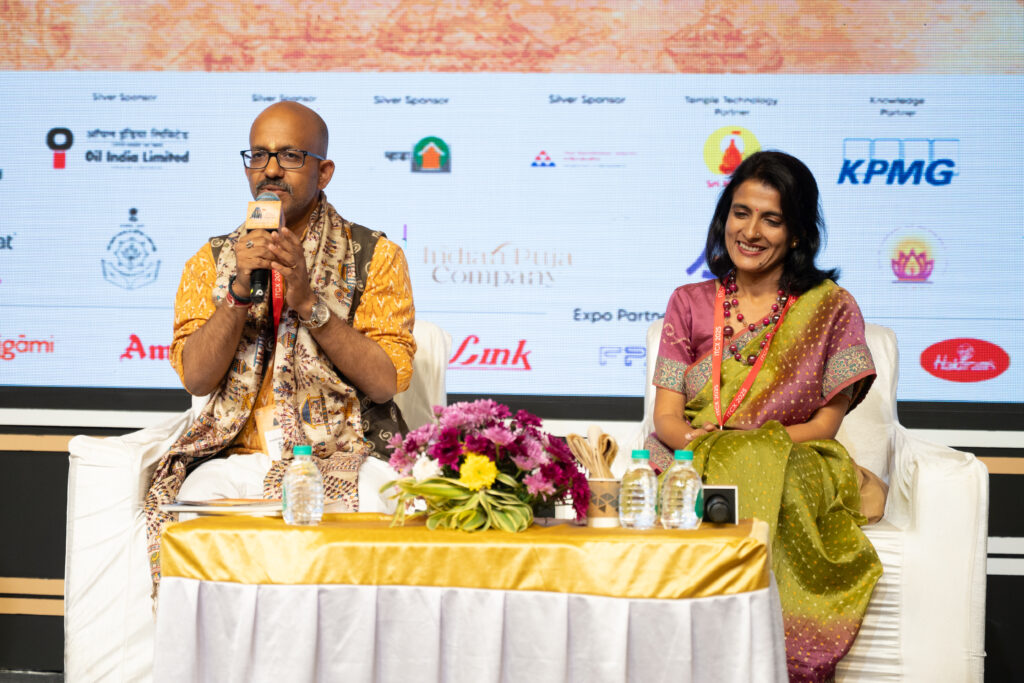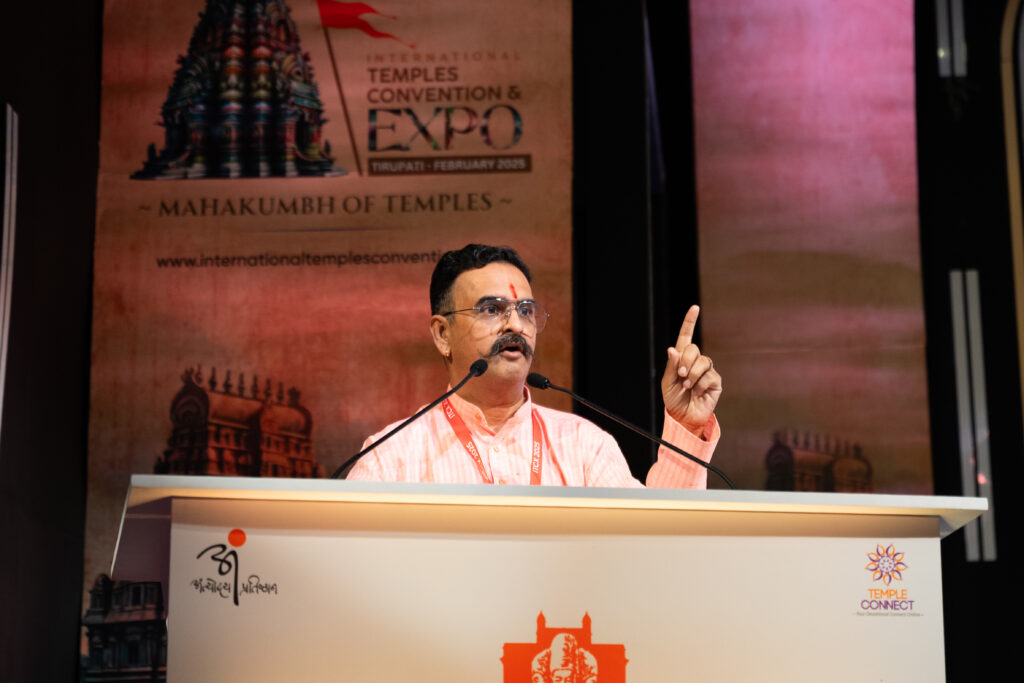
- The world’s biggest International Temples Convention & Expo (ITCX) 2025 witnessed the birth of a new dawn to maximise temple economy and echoed the cause of Sanatana Dharma
- Trio of Chief Ministers from Andhra Pradesh, Maharashtra and Goa graced the stage together for the very first time at the ‘Mahakumbh of Temples’
- PM Modi hailed the event as celebration of ‘Vasudhaiva Kutumbakam’ in special message
- Parampujya Sarsanghachalak Dr. Mohan ji Bhagwat, RSS, also shared a virtual message praising ITCX 2025 by Temple Connect for its effort in uniting temples worldwide
- Also joined in support by Shri Milind Parande (General Secretary Vishva Hindu Parishad), Shri K. Annamalai (State President, BJP, Tamil Nadu), Shri Rohan Khaunte (Goa Tourism minister) Shri Ashish Shelar (Minister of Technology and Cultural Affairs, Maharashtra) and Shri Nara Lokesh, Minister of Information Technology, Electronics and Communication,
TIRUPATI, ANDHRA PRADESH, THURSDAY, 22 FEBRUARY, 2025:
The International Temples Convention & Expo (ITCX) 2025, held in the spiritual heart of Tirupati, served as India’s largest and most influential gathering on temple management, concluded with an unprecedented congregation of 1,500+ temples, esteemed political leaders, and revered religious heads from across Hinduism, Sikhism, Buddhism, and Jainism.

Value-adding to the narrative of honourable Prime Minister Narendra Modi’s Viksit Bharat 2047, the event served as a transformative platform for shaping the future of temple governance, sustainability, and technological integration while reinforcing the timeless values of Sanatana Dharma. With thought-provoking discussions on temple autonomy, smart temples mission, and global best practices, ITCX 2025 has set a new benchmark in reimagining temples as centres of religious, cultural, and societal progress.

Envisioned by Giresh Kulkarni, founder of ITCX and Temple Connect, and Prasad Lad, ITCX Chairman who is also the Chief WHIP of Maharashtra Legislative Council, the platform has created a ripple effect, opening new avenues for temple leaders to reinvent temples as power centres of Hindu society. With India’s temple economy valued at ₹4-5 lakh crore, comparable to any major global industry, the discussions emphasized the need to operate temples as professional institutions where the common person’s donations directly benefit communities through medical aid, education, healthcare, and large-scale food distribution through langars. In only its second edition, ITCX has solidified its role as the driving force in reshaping temple management.
Honourable Prime Minister Narendra Modi, in a letter of appreciation, said: “ITCX reflects the inherent unity in diversity of temples globally, and is in a way, a celebration of the spirit of Vasudhaiva Kutumbakam – visualisation of the entire Earth as one family. The 21st century belongs to knowledge-driven societies. It is particularly in this context that the efforts of Temple Connect to document, digitise and share this rich heritage acquire greater significance.”
The first day saw three CMs namely Devendra Fadnavis (Maharashtra), N Chandrababu Naidu (Andhra Pradesh) and Pramod Sawant (Goa) come together on one stage for the first time, as well as Shri Shripad Naik – Central Minister & Minister of State for New and Renewable Energy of India. Day two saw Shri K. Annamalai – State President, BJP Tamil Nadu and Shri Milind Parande – General Secretary, Vishva Hindu Parishad power the cause of liberating Hindu temples from government control. The closing day continued to make an impact with Nara Lokesh, Minister for Human Resources Development, AP, who acknowledged that “the time has come for us to pull together a world class convention like ITCX to bring thought leadership, exchange ideas and best practices. We live in an era where we talk about Spiderman, Superman and Avengers, but we also have our samskriti (cultural heritage) that we need to save and that is going to be very important.”
The mega event united thought leaders, spiritual luminaries, and changemakers from different generations and regions by their commitment to exact socio-economic reform within their own temple ecosystems.
Intellectuals such as Shri Kiran Shinde, an expert in temple ecosystems from Maharashtra, now in Australia, and Shri Shantanu Gupta, the official biographer of Yogi Adityanath, added critical perspectives on governance and cultural revival. C R Mukunda and author Ami Ganatra further enriched the discourse, bridging historical narratives with contemporary relevance. This intergenerational and pan-Indian congregation underscored ITCX’s role as the ‘Mahakumbh of Temples,’ fostering dialogue, knowledge exchange, and a unified vision for the future of temple ecosystems in India and beyond. Audiences were also moved by the revered wisdom of Sri Vidyaranya Bharathi Swamiji of Hampi and Shri La Sri Narayana Desika Swamigal, the 14th Pontiff of Kovilur Mutt.
Leaders at the world’s largest temple management event were quoted as saying:
Shri Prasad Lad ji, ITCX Chairman who is also the Chief WHIP of Maharashtra Legislative Council, quoted from the scriptures: “Dharmo Rakshati Rakshitah. If we protect dharma, then dharma will also protect us. It’s a speciality of the Sanatana Dharma – which isn’t limited to worship but is also a symbol of duty, truth and service. Keeping in mind the larger picture of making India a developed, strong and self-reliant nation by 2047, if the economy of temples and places of worship is linked to the country’s economy, it can play a vital role in nation-building.”
Devendra Fadnavis, CM of Maharashtra, talked about how important it is to be a Sanatani in today’s day and age. “I want to congratulate the team behind the Temple Connect initiative which is helping temples contribute to propel the economy as a study states that 55% of our citizens are opting for spiritual tourism. Temples should become a centre of equality and community, and ITCX has become a global movement which will guide the Sanatana Dharma in a new direction”
N Chandrababu Naidu, CM of Andhra Pradesh, said, “All devotees are donating money for a particular cause. That money has to be spent as per the aspirations of the devotee. We want to have a Balaji temple in every state, and every part of the world where Hindus reside. India is a young country and our youth is our demographic dividend. I am very confident by 2047 India will become number one in the world and Indians globally will be the most influential community.”
C R Mukunda, Sah Sarkaryavah, RSS, said, “Big temples which are financially strong can assist smaller temples with humble resources to keep the devotion and faith alive. There are many temples like Tirupati, and one in Karnataka, which are helping in the renovation and resurrection of these smaller temples. These temples can help in propagation of Hindu faith and Sanatani values and culture amongst the villages.”
K Annamalai said, “When Lord Venkateshwara gives us the opportunity for the NDA to come to power, we want to remove the illegal Hindu Religious and Charitable Endowments Acts (HR & CE) and free all the 44,121 temples from HR & CE. Imagine the kind of temple economy and money we will generate, helping the schools around the temples run, taking care of the civic infrastructure of a particular city, running engineering schools, and also running the centres for excellence in science. That is the kind of revenue; even if the temples are mismanaged, it can generate.”
As the convention addressed crucial aspects of temple administration and autonomy, VHP General Secretary Milind Parande proposed a new regulatory framework, including the formation of state-level Rajya Dharmik Parishads to ensure transparency. The proposal emphasized broader representation of women and SC-ST communities while maintaining individual temple autonomy.
He said “Our temples don’t need centralised control. We want our temples to be free, keeping with the law of the land. Our idea is not to take the temples from one system and put it in another. The autonomy of all temples will be respected, bureaucracy will be left out and broader representation of women and SC-ST will be ensured.”
Giresh Kulkarni, in his closing speech, said, “ITCX is more than just an event—it’s a movement aimed at revolutionising temple ecosystems through innovation and sustainability. It is our commitment to nation building. With India emerging as the global epicentre of devotion and spiritual tourism, there is a pressing need to organise, empower, and systematise temple operations to make them future ready. By implementing smart management strategies, we can ensure temples remain vibrant centres of spirituality, tradition, and community development.”

At the concluding ceremony, Prasad Lad also made a landmark announcement about the formation of International Temples Federation, a global movement to unite the integrity of Sanatana Dharma.
Recognising the relentless efforts behind ITCX, Shri Prasad Lad and Shri Giresh Kulkarni were felicitated with the prestigious Chandi Mukut by Peetha Adhyaksh Sri Satpal Sharmaji Guruji of Shri Devikup Mahabhadrakali Shaktipeeth. This honor celebrated their contributions to temple administration, religious tourism, and spiritual heritage preservation, particularly through Temple Connect and ITCX.
Elevating devotee experience stood at the heart of ITCX 2025, which facilitated global collaboration between temple leaders, policymakers, and industry experts to focus on progressive temple management beyond religious aspects through keynote addresses, panel discussions, and workshops covering topics from fund management and crowd control to AI integration, sustainable practices, and community services—all aimed at creating more efficient and socially impactful temple ecosystems that aligned with the core theme of ‘engaging, empowering and enhancing the temple economy.’
ITCX 2025 garnered support from the Government of India through the Ministry of Tourism, Ministry of Culture, and the Incredible India initiative, with Maharashtra Tourism Development Corporation (MTDC) joining as presenting partner. The convention was further strengthened by the backing of the Archaeological Survey of India and Tourism & Endowments boards from Andhra
Pradesh, Kerala, Karnataka and other such Indian states.






